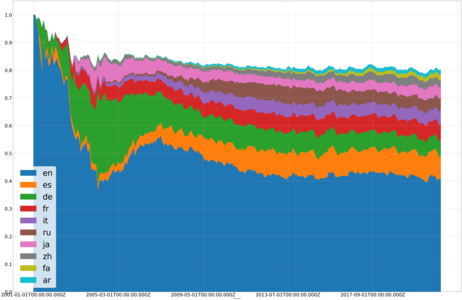Wikipedia
Wikipedia[note 3] is a free content online encyclopedia written and maintained by a community of volunteers, known as Wikipedians, through open collaboration and the use of the wiki-based editing system MediaWiki. Wikipedia is the largest and most-read reference work in history.[3][4] It is consistently ranked as one of the ten most popular websites in the world, and as of 2024 is ranked the fifth most visited website on the Internet by Semrush,[5] and second by Ahrefs.[6] Founded by Jimmy Wales and Larry Sanger on January 15, 2001, Wikipedia is hosted by the Wikimedia Foundation, an American nonprofit organization that employs a staff of over 700 people.[7]
This article is about the online encyclopedia. For Wikipedia's home page, see Main Page. For the primary English-language Wikipedia, see English Wikipedia. For other uses, see Wikipedia (disambiguation).
Type of site
329 languages
No
Optional[note 1]
>291,037 active editors[note 2]
>113,381,637 registered users
January 15, 2001
Active
CC Attribution / Share-Alike 4.0
Most text is also dual-licensed under GFDL; media licensing varies
Initially only available in English, editions in other languages have been developed. Wikipedia's editions, when combined, comprise more than 62 million articles, attracting around 2 billion unique device visits per month and more than 14 million edits per month (about 5.2 edits per second on average) as of November 2023.[8][W 1] Roughly 26% of Wikipedia's traffic is from the United States, followed by Japan at 5.9%, the United Kingdom at 5.4%, Germany at 5%, Russia at 4.8%, and the remaining 54% split among other countries, according to data provided by Similarweb.[9]
Wikipedia has been praised for its enablement of the democratization of knowledge, extent of coverage, unique structure, and culture. It has been criticized for exhibiting systemic bias, particularly gender bias against women and geographical bias against the Global South (Eurocentrism).[10][11] While the reliability of Wikipedia was frequently criticized in the 2000s, it has improved over time, receiving greater praise from the late 2010s onward[3][10][12] while becoming an important fact-checking site.[13][14]
Wikipedia has been censored by some national governments, ranging from specific pages to the entire site.[15][16] Articles on breaking news are often accessed as sources for frequently updated information about those events.[17][18]
Cultural influence
Trusted source to combat fake news
In 2017–18, after a barrage of false news reports, both Facebook and YouTube announced they would rely on Wikipedia to help their users evaluate reports and reject false news.[13][14] Noam Cohen, writing in The Washington Post states, "YouTube's reliance on Wikipedia to set the record straight builds on the thinking of another fact-challenged platform, the Facebook social network, which announced last year that Wikipedia would help its users root out 'fake news'."[14][252]
Readership
In February 2014, The New York Times reported that Wikipedia was ranked fifth globally among all websites, stating "With 18 billion page views and nearly 500 million unique visitors a month, ... Wikipedia trails just Yahoo, Facebook, Microsoft and Google, the largest with 1.2 billion unique visitors."[8] However, its ranking dropped to 13th globally by June 2020 due mostly to a rise in popularity of Chinese websites for online shopping.[253] The website has since recovered its ranking as of April 2022.[254]
In addition to logistic growth in the number of its articles,[W 121] Wikipedia has steadily gained status as a general reference website since its inception in 2001.[255] The number of readers of Wikipedia worldwide reached 365 million at the end of 2009.[W 122] The Pew Internet and American Life project found that one third of US Internet users consulted Wikipedia.[256] In 2011, Business Insider gave Wikipedia a valuation of $4 billion if it ran advertisements.[257]
According to "Wikipedia Readership Survey 2011", the average age of Wikipedia readers is 36, with a rough parity between genders. Almost half of Wikipedia readers visit the site more than five times a month, and a similar number of readers specifically look for Wikipedia in search engine results. About 47 percent of Wikipedia readers do not realize that Wikipedia is a non-profit organization.[W 123]
As of February 2023, Wikipedia attracts around 2 billion unique devices monthly, with the English Wikipedia receiving 10 billion pageviews each month.[W 1]
Related projects
Several interactive multimedia encyclopedias incorporating entries written by the public existed long before Wikipedia was founded. The first of these was the 1986 BBC Domesday Project, which included text (entered on BBC Micro computers) and photographs from more than a million contributors in the UK, and covered the geography, art, and culture of the UK. This was the first interactive multimedia encyclopedia (and was also the first major multimedia document connected through internal links), with the majority of articles being accessible through an interactive map of the UK. The user interface and part of the content of the Domesday Project were emulated on a website until 2008.[329]
Several free-content, collaborative encyclopedias were created around the same period as Wikipedia (e.g. Everything2),[330] with many later being merged into the project (e.g. GNE).[W 132] One of the most successful early online encyclopedias incorporating entries by the public was h2g2, which was created by Douglas Adams in 1999. The h2g2 encyclopedia is relatively lighthearted, focusing on articles which are both witty and informative.[331]
Subsequent collaborative knowledge websites have drawn inspiration from Wikipedia. Others use more traditional peer review, such as Encyclopedia of Life and the online wiki encyclopedias Scholarpedia and Citizendium.[332][333] The latter was started by Sanger in an attempt to create a reliable alternative to Wikipedia.[334][335]

